|
Die meisten dieser Menschen sind Kinder von Menschen die ebenfalls so gehaust haben. Die Ärmsten der Armen produzieren die meisten Kinder die wieder in der Gosse landen. Solchen Menschen mit Geld zu unterstützen das bringt einfach nichts. Gibt man denen heute Geld so ist das morgen für Statussymbole wie Handy oder Alkohol ausgegeben. Das Geheimnis ist Bildung, wir beobachten dies seit Jahren in Südamerika. Je gebildeter die Menschen sind und je besser es denen dadurch geht desto weniger Nachwuchs. Lieber weniger Kinder und denen eine gute Zukunft bieten als viele Kinder die wieder in der Gosse landen. Apropos Weihnachtszeit, Spendenzeit: Die meisten Hilfsorganisationen geben das Geld für Werbung und Promotion aus, für die Hilfsbedürftigen bleibt nicht viel übrig. Die Stiftung Warentest hat 46 Organisationen genau unter die Lupe genommen. Nach den eingehenden Untersuchungen blieben von den 46 Organisationen nur sechs übrig, die von den Testern als wirtschaftlich arbeitend, transparent und gut organisiert beurteilt wurden. Wir haben 2009 in Südamerika Casper, einen Holländer getroffen. Casper war auf Weltreise, wen es interessiert, der schaue hier www.ctjansen.nl 10 Jahre Weltreise, around the world for friendship and understanding. Wir sind in Kontakt geblieben. Irgendwann kam eine Mail Casper hat von Südamerika nach Afrika verschifft, irgendwann kam eine Mail Casper hat sich in Mali im Busch ein kleines Stück Land gekauft um dort einen kleinen Campingplatz zu eröffnen. Und irgendwann war Krieg, die Kunden blieben aus, den Menschen geht es schlecht. Casper Jansen hat nun ein Projekt mit 44 Frauen im Nachbardorf gestartet, Casper bringt den 44 Frauen bei wie man sich selbst versorgt und Gemüse pflanzt. Aber man muß das Grundstück bewässern da es 8 Monate im Jahr nicht regnet. Aber lest es selbst, die Mail ist leider nur auf Englisch, ich bin zu faul um all das schriftlich zu übersetzen. „For those who are getting my mail for the first time, or who have forgotten who I am, I am Casper. I spend the last ten years driving across the world in my MAN truck. Asia, South America and Africa, plus some countries in Europe and Russia and Mongolia. After the ten years travelling (the reults of which you can read on www.ctjansen.nl) I sort of accidently ended up in the bush-bush of Mali, where I bought a piece of land on a river, build a house and sold my truck. I have been living here for a year and a half now and am enjoying it still. Mali is a nice country with friendly but poor people. I started to construct a campsite for overlanders. However, my plans did not take into account the start of a war in the northern parts of Mali, only weeks after I signed all papers. Understandebly, tourists stayed away from Mali and my campsite is mainly deserted. But I am hoping for better times to come. Slowly I starte to get interested in the local community and its problems. As I said, Mali is a very poor country and the war did not help it. Its always the poor who suffer when some sealots start shooting. Last year I helped a local community buy a new canoe, with help of my faithfull readers. The project was a succes and the canoe is still in use, every day. During my travels I have always labeled aid workers and organisations as money guzzeling idiots who are helping to make a buck themselves. My opinion on this has not changed. I am talking about the big aid organisations like Oxfam or Red cross where, from every Euro donated, not even half gets to be spend on aid, very often on projects that are doomed to fail. Aid workers driving around in big cars with driver and living in expensive houses, who has not seen this. Its a business in itself. As I said the locals here are very poor. The village nearest to me has about 17 families, no electric or running water, high infant mortality, no medical facilities etc, the things you see often. Due to their poorness they are very religious. That might bring piece of mind but no progress. I want to help them, but in such a way that it is simpel, cheap, durable and will bring progress over a longer period of time. And I am not making any money on it, believe me. On the contrary, I myself am putting money into the project. However I can not finace it all myself so I am asking you for help (nono, don't click away the message now). Off al the millions, no billions, that go into projects that are doomed to fail, due to the aid workers leaving, or because the locals are not really interested in the project, or its poorly organised, we should be able to create a small project that works. And that is the project ' Garden Dialakoto' that I am starting now. I live here so I can now, and in the future, oversee the project. The 44 woman of Dialakoto will get a plot of land to cultivate, all year round. It does not rain for 8 months in Mali so having a plot of land with a water supply and fenced in against the usuall thieves (cows, sheep, goats, donkeys and moneys) should allow these women to grow their basic vegetables all year round, that way improving their, and their families, nutritional intake. Improving health and at the same time improving the environment. Now the women go to cut wood in the brush. They sell this to get money to buy vegetables in the market. We have agreed that this practise will almost come to an end. I am asking to please, please contribute a little to this project. No need for a lot (although always welcome ofcourse :-) ), but if all people who read this mail donate a few Euro, buck, roepies, pounds, francs or shillings, we should be able to help a whole village enjoy live a bit more. The stimate is that the whole thing will cost about 1500 euro. I still have some money left over from the canoe project and will contribute some myself, so I am desperatly looking for about 1000 euro. In the last 10 years I have written a lot on travelling, helped a lot of other overlanders and tourist, shared all my information. All for free, never demanded a penny. If you have enjoyed this, please think of my request as a small repayment for my effords. All my experiences I currently publish on my new website www.coolcampmali.com under the heading ' stories', both in Dutch and English. I update it once a month, if possible, with pictures. But internet connection in the bush-bush is, to say the least, slow as shit and independable. So excuse me if the pictures are not always there. This way at least you can stay informed of any developments. So, to cut through the cheese, as we say in Holland, please donate whatever you feel appropiate. Here are my details: Casper Jansen BP 14 Manantali, Mali tel +223 72443708 The bank account is in Holland and from most of Europe you should be able to easily transfer money. The account IBAN NL67 RABO 0167843672 in the name of C.T. Jansen, in Berg en Dal, Holland, the bic or swift code of the rabo bank in Holland is RABONL2U, mention the garden of Dialakoto. If you can or will not donate anything, please help me to forward this message to all your friends. I would be most gratefull. So remeber, check www.coolcampmali.com or on facebook www.facebook.com/coolcampmali And also remeber that you are always welcome here. For your donation I will give you free stay. And Mali is so beautifull, you will enjoy it for sure. Otherwise, just let me know how you are, I long to here about you. Thanks, from me and the 44 woman in Dialokoto, Casper Mit den gesammelten Spenden passiert gerade folgendes: Since you have donated money for the garden project of Dialakoto or an earlier project. It is time to give you some information on the status of developments of the project. First of all I would like to thank you very very much for helping me to realise this project. This way we can help the local people directly, without a lot of money spend on other things like big cars or expensive salaries. 100% of all money donated goes directly to the project and thus the local people. Let me first give you some background on the situation. Dialakoto is situated on the other site of the river Baffing from the big village of Manantali. This Manantali also used to be a small village but thanks to the construction of the Dam by German engineers, it has grown to be quite a sizeable village. Manantali enjoys electric, running drinking water and even some stretches of asphalt road. There is enough power available, the dam generates enough to sell to Mauritania and Senegal, giving the government of Mali the hard needed foreign income. You would think with so much electric nearby, all would enjoy connections, but sadly the electric and water is for one side of the river only. We, on this side can only sadly look at all the lights across the river at night. Drinking water is also not available, locals will either drink the not safe to drink river water or water from dug well's. Also there is no decent road on this side of the river, and no plans to repair the damaged sand road that runs along the river bank on this side. Most of the people living in Dialakoto come from other places in the area. During the construction of the dam and the subsequent filling of the big lake behind the dam, many villages had to relocate. The financial support that was promised sadly disappeared in some officials pockets. A few people from the village work at the dam project, mostly in low paid manually labour jobs, due to the fact that they have no proper education. Night guard, road maintenance, that kind of jobs, but mostly people are dependent on cultivation for their food. Since it does not rain in these parts for 8 months, its a bit of a problem. In the three or four months one has to cultivate for the whole year. When the rainy season is bad (to much or to little rain) people suffer. During dry season one tries to collect some money buy gathering and selling wood, doing odd jobs or shoot any living animal for dinner. Many young man leave for the gold mines in the west of Mali, only to return poorer at the beginning of the next rainy season. You would think that having a river next door means enough water to cultivate. But carrying the water by hand every day is not an option (to much water needed) and money for a pump is not available. One does not plan, does not think about tomorrow or next week. If one finds money, it is immediately spend on stupid things like a motorbike or new telephone. Only to realise that after a month they have no money to buy fuel or credit for their mobil phone. The status of a shiny phone or fast motorbike is stronger then the will to save. Their situation without future has made people like brain-dead. Their is no future so why worry. Praying hard might work. This way of life is seen all through Africa and hard to change. Result of this situation and state of mind is that they eat very one-sided and simple. Rice, sometimes with a sauce of peanuts or leaves of one sort of plant or another. Many people have symptoms of malnourishment, specially children. Rice belly's, festering wounds, a kind of scurfy head skin, or Bilhartsiose (a disease from entering stagnant water to search for fish or wash their clothes) To help the village closest to me (Dialakoto) I have decided to start a vegetable garden project. I have seen this construction before in mali and it seems to work very well. I, with your help, supply a fenced in piece of land with water taps, seeds to plant. This way they can grow things all year long. The main purpose is to cultivate for themselves. If production is good they could sell some surplus to the market, this way gaining some money. Their food supply will be less monotonous and more healthy, their is less need to spend the little money they have on vegetables in the market. At the same time I shall explain the principle of saving money for the future or for calamities, something I am already successfully doing with the people who work for me. 'Just' creating a garden is of course not done in Mali. There are problems to be solved, people have to give their permissions and that is not always easy. There is jealousy and a hunger for money. The preparations are not as quick as I want them to be. But things certainly progress and I am one step away from starting the construction. The land has been made available by the chef-de-village, or village-chief. I however, want things on paper. He is an old man and may die some time. His children, his heirs, made not agree with the arrangement and claim back the land. Or perhaps he himself might change his mind and ask for rent or so. So i made a small contract which he refused to sign. After two weeks he still refused to sign so I went to visit him with the mayor of Manantali. After this he caved and, after some adaptions, promised to sign. The second big hurdle was the manager of the water supply company. His name is Foufana, a bit older and about to retire, he loves money. There is a huge irrigation project on this side of the river. A big pipe of about a meter diameter passes on the side of the road, passes my property, all the villages only to end up in a huge basin about 3 km from here. From there the water flows through an open half-pipe back into the river. Mr Foufana had denied all access to these millions of litres of water that flow through this pipe every day. Apparently he wanted money for any water taken, and money is something people do not have. So in the past few years the irrigation project has only irrigated the river itself. What a waste of development. When I came here about two years ago, I negotiated a water connection and I was the first to take water from this huge pipe. I gave water to my neighbour and to Boly (much to the chagrin of Foufana) but very slowly some agriculture projects have been started. Boly has planted more then 200 banana trees and further down the road a new garden has arisen. On demanding water for my garden project he initially agreed. But a week later a delegation with the new minister of agriculture visited Manantali and was not very pleased with the non-development in this area. The result s that mr Foufana has now changed his mind and has told me to wait with the connection. I think he is afraid, since now he is in the picture of his minister, who has seen the results of years of corruption. A sort of stalemate has developed. I will of-course not let it rest, I do not give up that easily. Last week I have requested the mayor to pay Foufana a visit, and I have let to plumbers, who are big friends of him, know that I want to go ahead, and how to get result. If in the coming weeks he is still holding up the project, I will go over his head to his boss in Bamako. Once I have clearance of him, I can start the work. The land has been cleared, the people who have to dig the holes for fence and water pipe are ready, the women of Dialakoto are anxiously waiting the completion. I have bought fence in Bamako, as well as poles, water pipe and taps, all the connections. We are all ready. I have even gotten some seeds from the Dutch seed company Bakker Brothers to distribute, so the women can start planting immediately. So that's how the development situation is at the moment. I am quite sure I will get the go-ahead soon, and we can start soon. Financially I have received enough money to realise the project. I have estimated the costs to be about 1500 euro, I have received a little more, so I can build a small shed on the property to house materials and perhaps, when needed, a night watch I have made up a contract for the women. Each of them will have to sign it. This contract informs them that they have to pay 100 Francs every month (20 cents), in order to pay the water bill and any maintenance needed. It also states that they are not allowed to plant any big things like papaya or mango trees. This will take away the sun from the neighbours plot. So I have assigned a separate area to plant these. I will also assign an area for organic garbage and one for other (which I will burn once in a while). The organic should give them the needed fertiliser after some months. There are some other rules to keep things clean and in order. My plan is to inform you about once a month during the development of the garden, and a few times a year once it is running. If you have any comments, questions, ideas, please let me know. Maybe you have some experience you wish to share, they are always welcome. For now, thanks again for your generous contribution, until soon Greetings from beautiful Mali, Casper Soweit die Mail, Casper beantwortet gerne jede Frage, hier ist seine Adresse: Jeder der dem Casper eine Kleinigkeit spendet kann dafür gratis auf seinem Campingplatz logieren, sollter er mal nach Mali kommen. Wir haben eine Kleinigkeit gespendet, einen sicheren Stellplatz in Mali haben wir schon, man weiß ja nie wo man eines Tages noch hinkommt auf dieser Welt. Themenwechsel, heute ist Sonntag, 1. Dezember 2013, der erste Adventsonntag. Ist es zu Hause bereits eisig kalt, hat es in Österreich an diesem Wochenende bereits geschneit und brennt zu Hause heute die erste Adventkerze so brennt hier heute auch die erste Adventkerze aber es beginnt in Südamerika langsam der Sommerurlaub. Sieht es wochentags am Strand hier so aus |
|||||||||||||||||||||||||||||||||||||||||||||||||||||||||||||||||||
 |
|||||||||||||||||||||||||||||||||||||||||||||||||||||||||||||||||||
so sieht es heute hier so aus, |
|||||||||||||||||||||||||||||||||||||||||||||||||||||||||||||||||||
 |
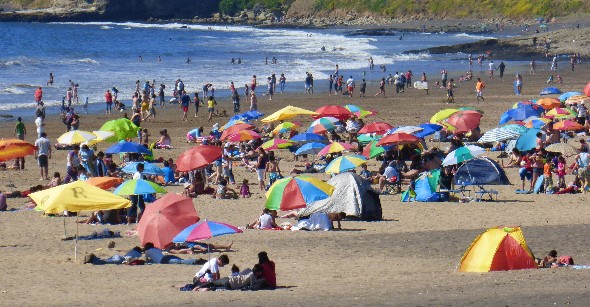 |
||||||||||||||||||||||||||||||||||||||||||||||||||||||||||||||||||
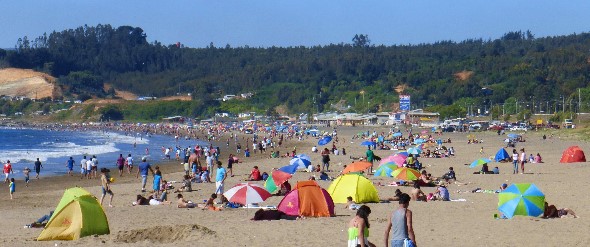 |
|||||||||||||||||||||||||||||||||||||||||||||||||||||||||||||||||||
|
die zweitgrößte Stadt Chiles, Concepcion, liegt 40 Kilometer nördlich von uns. Der eine hat Wochenende, bei dem anderen beginnt der Urlaub, |
|||||||||||||||||||||||||||||||||||||||||||||||||||||||||||||||||||
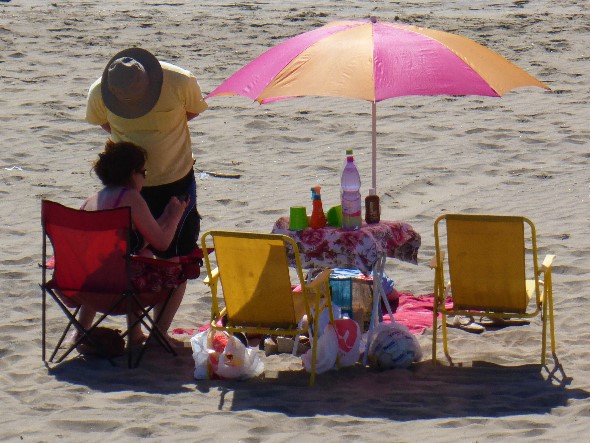 |
|||||||||||||||||||||||||||||||||||||||||||||||||||||||||||||||||||
 |
|||||||||||||||||||||||||||||||||||||||||||||||||||||||||||||||||||
die Wochenendler und Urlauber stellen Strandzelte auf, um sich umziehen, um Windschutz zu haben, um Schatten zu haben, um Liebe zu machen. |
|||||||||||||||||||||||||||||||||||||||||||||||||||||||||||||||||||
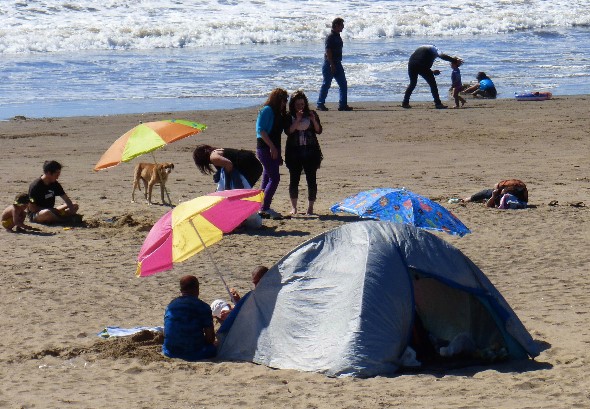 |
|||||||||||||||||||||||||||||||||||||||||||||||||||||||||||||||||||
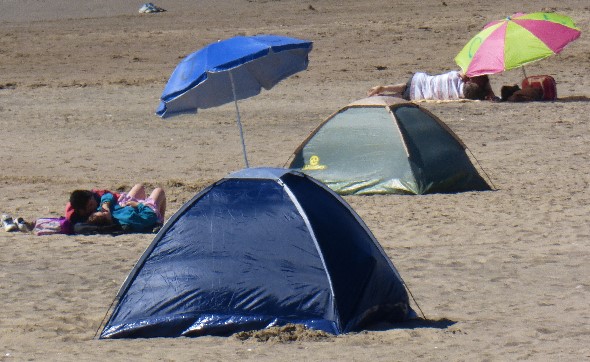 |
|||||||||||||||||||||||||||||||||||||||||||||||||||||||||||||||||||
Da gibt es Bräute daß man noch mal 20 sein möchte |
|||||||||||||||||||||||||||||||||||||||||||||||||||||||||||||||||||
 |
 |
||||||||||||||||||||||||||||||||||||||||||||||||||||||||||||||||||
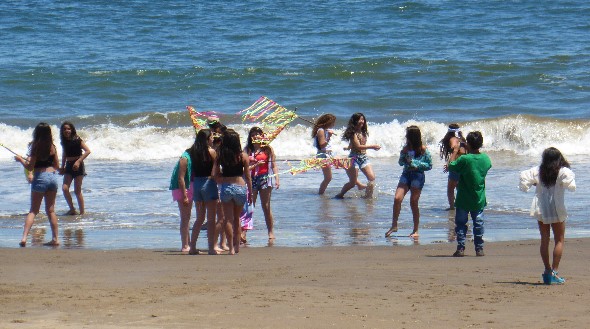 |
|||||||||||||||||||||||||||||||||||||||||||||||||||||||||||||||||||
 |
|||||||||||||||||||||||||||||||||||||||||||||||||||||||||||||||||||
und betrachtet man den Strand durch das Teleobjektiv |
|||||||||||||||||||||||||||||||||||||||||||||||||||||||||||||||||||
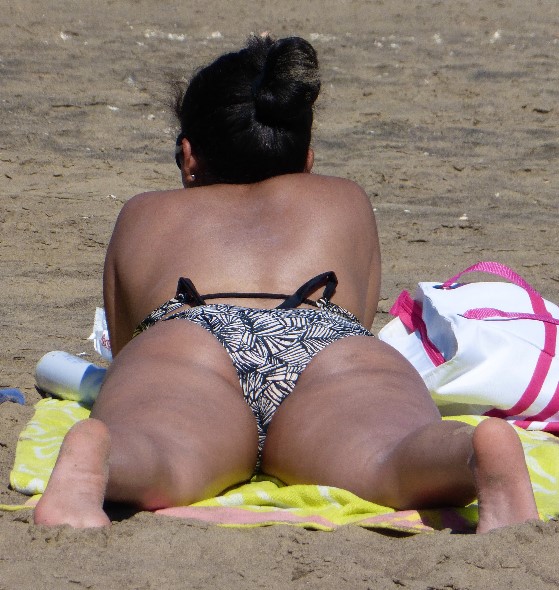 |
 |
 |
|||||||||||||||||||||||||||||||||||||||||||||||||||||||||||||||||
so sieht das im Detail heute hier so aus. |
|||||||||||||||||||||||||||||||||||||||||||||||||||||||||||||||||||
 |
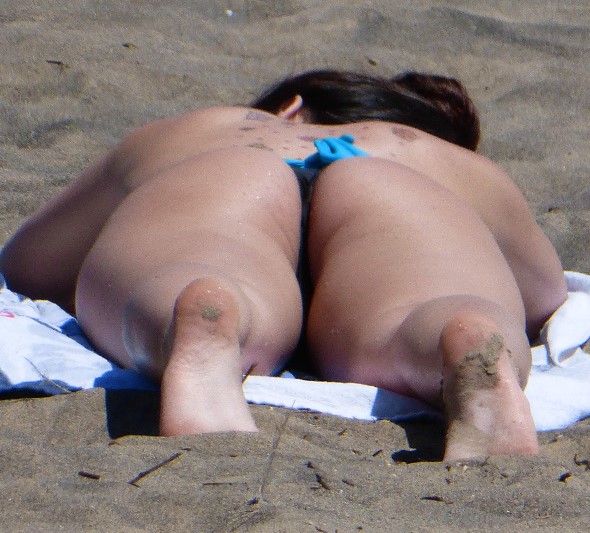 |
||||||||||||||||||||||||||||||||||||||||||||||||||||||||||||||||||
 |
|||||||||||||||||||||||||||||||||||||||||||||||||||||||||||||||||||
 |
|||||||||||||||||||||||||||||||||||||||||||||||||||||||||||||||||||
 |
 |
||||||||||||||||||||||||||||||||||||||||||||||||||||||||||||||||||
Die klugen Hunde wandern in den Schatten, |
|||||||||||||||||||||||||||||||||||||||||||||||||||||||||||||||||||
 |
|||||||||||||||||||||||||||||||||||||||||||||||||||||||||||||||||||
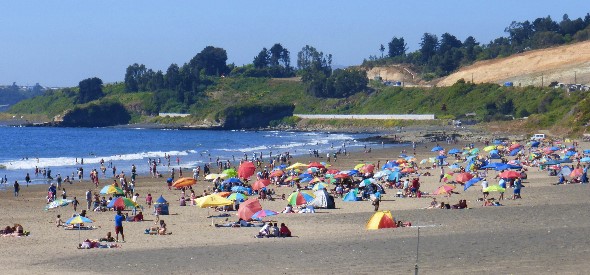 |
 |
||||||||||||||||||||||||||||||||||||||||||||||||||||||||||||||||||
die Menschen braten in der Sonne oder schwitzen im Zelt. |
|||||||||||||||||||||||||||||||||||||||||||||||||||||||||||||||||||
 |
|||||||||||||||||||||||||||||||||||||||||||||||||||||||||||||||||||
 |
 |
||||||||||||||||||||||||||||||||||||||||||||||||||||||||||||||||||
Da fährt die Armada de Chile als Strandpolizei die Strände ab, |
|||||||||||||||||||||||||||||||||||||||||||||||||||||||||||||||||||
 |
|||||||||||||||||||||||||||||||||||||||||||||||||||||||||||||||||||
 |
 |
||||||||||||||||||||||||||||||||||||||||||||||||||||||||||||||||||
da fahren die Carabinerie als Straßenpolizei die Wege ab. |
|||||||||||||||||||||||||||||||||||||||||||||||||||||||||||||||||||
 |
|||||||||||||||||||||||||||||||||||||||||||||||||||||||||||||||||||
 |
Bei wieder anderen aber ist Saisonbeginn, die laufen sich ab nun die Füße wund. Da gibt es Spielsachen- und Sonnenschirmverkäufer, |
 |
|||||||||||||||||||||||||||||||||||||||||||||||||||||||||||||||||
 |
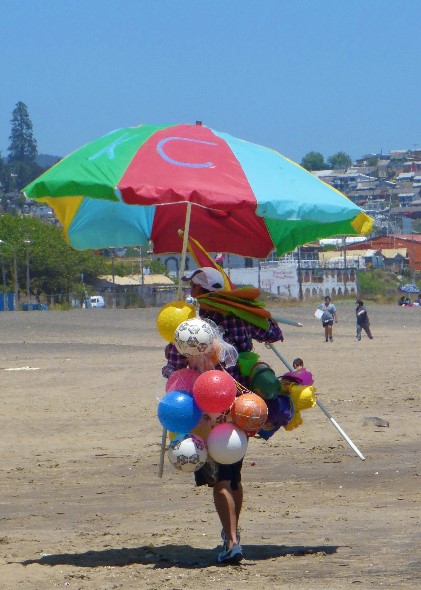 |
 |
|||||||||||||||||||||||||||||||||||||||||||||||||||||||||||||||||
 |
 |
||||||||||||||||||||||||||||||||||||||||||||||||||||||||||||||||||
 |
|||||||||||||||||||||||||||||||||||||||||||||||||||||||||||||||||||
da gibt es Sonnenschirmvermieter, da gibt es Pferdevermieter. |
|||||||||||||||||||||||||||||||||||||||||||||||||||||||||||||||||||
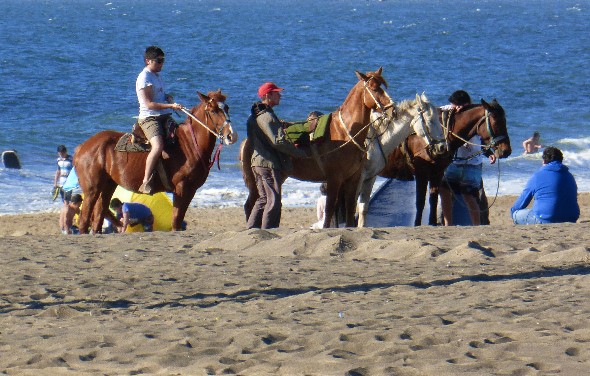 |
|||||||||||||||||||||||||||||||||||||||||||||||||||||||||||||||||||
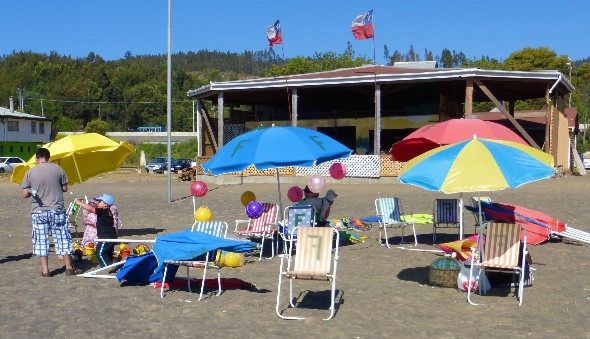 |
|||||||||||||||||||||||||||||||||||||||||||||||||||||||||||||||||||
Da gibt es Badetuchverkäufer, da gibt es Schmuckverkäufer. |
|||||||||||||||||||||||||||||||||||||||||||||||||||||||||||||||||||
 |
 |
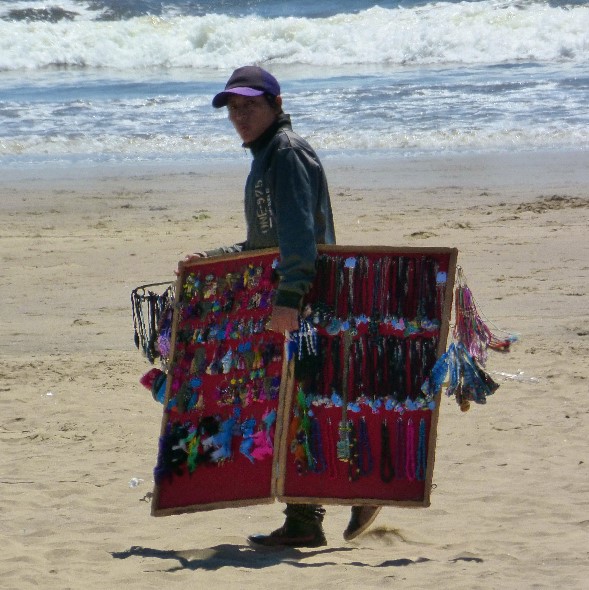 |
|||||||||||||||||||||||||||||||||||||||||||||||||||||||||||||||||
Da gibt es Essens- und Zuckerwatteverkäufer, |
|||||||||||||||||||||||||||||||||||||||||||||||||||||||||||||||||||
 |
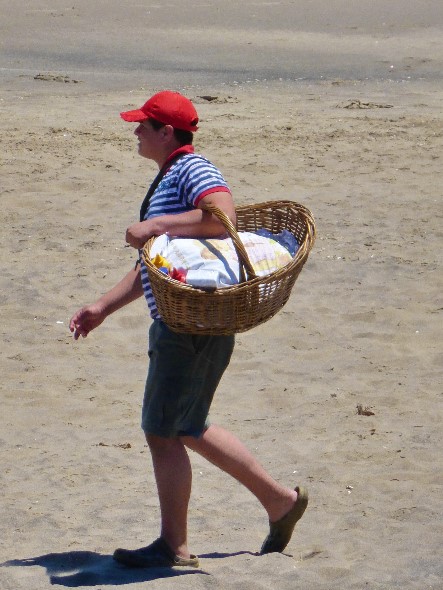 |
 |
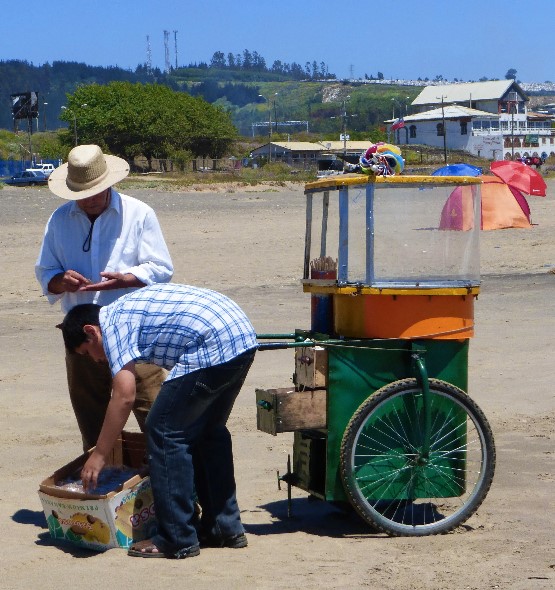 |
||||||||||||||||||||||||||||||||||||||||||||||||||||||||||||||||
da gibt es Eisverkäufer. |
|||||||||||||||||||||||||||||||||||||||||||||||||||||||||||||||||||
 |
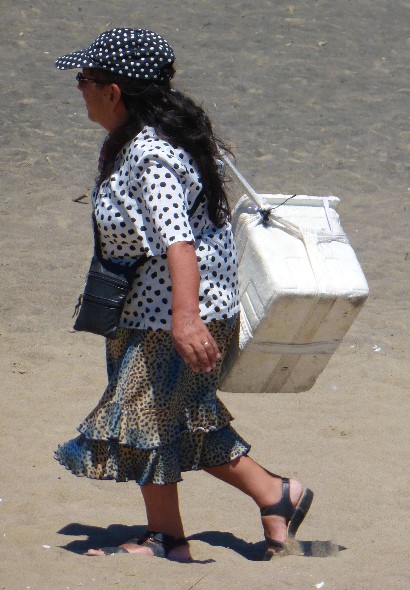 |
 |
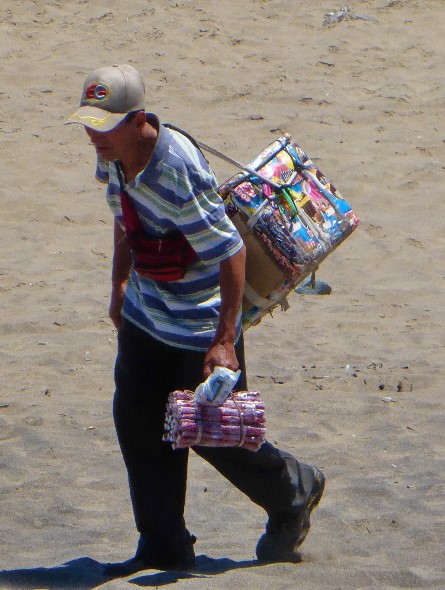 |
 |
|||||||||||||||||||||||||||||||||||||||||||||||||||||||||||||||
 |
Die Urlauber Südamerikas kaufen bei diesen fliegenden Händlern gerne und viel, man kommt ja erst am Strand drauf daß man ev. auch mal Durst hat, daß die Kinder spielen wollen oder daß ein Sonnenschirm von Vorteil wäre. Der Eisverkäufer und der Süßigkeitenverkäufer liefert uns Süßes frei Haus, ein hartes Leben. |
||||||||||||||||||||||||||||||||||||||||||||||||||||||||||||||||||
 |
 |
||||||||||||||||||||||||||||||||||||||||||||||||||||||||||||||||||
 |
 |
||||||||||||||||||||||||||||||||||||||||||||||||||||||||||||||||||
 |
|||||||||||||||||||||||||||||||||||||||||||||||||||||||||||||||||||
 |
So eine Süßigkeit, Schokospitz mit Kokosraspeln, kostet 300 Pesos, das sind knappe 50 Eurocent. Auf dem Tablett sind etwa 50 Stück, der Mann läuft den ganzen Nachmittag durch den heißen weichen Sand. Am Abend sind noch ca. 10 Stück am Tablett. 40 verkaufte Stück mal 50 Eurocent sind 20 Euro. Zieht man davon ab daß seine Frau für die Produktion 2 Stunden benötigt hat und zieht man davon die verwendeten Zutaten ab und zieht man davon ab daß der Mann mit dem Auto zum Strand fahren mußte so kommt man auf einen Stundenlohn von € 1,- bis € 2,-. Da gibt es Windschutzscheibenabdecker inkl. Parkplatzeinweiser, eine Dienstleistung die eigentlich niemand wirklich benötigt aber jeder gibt eine Kleinigkeit, so kann auch der überleben ohne stehlen zu müssen. |
||||||||||||||||||||||||||||||||||||||||||||||||||||||||||||||||||
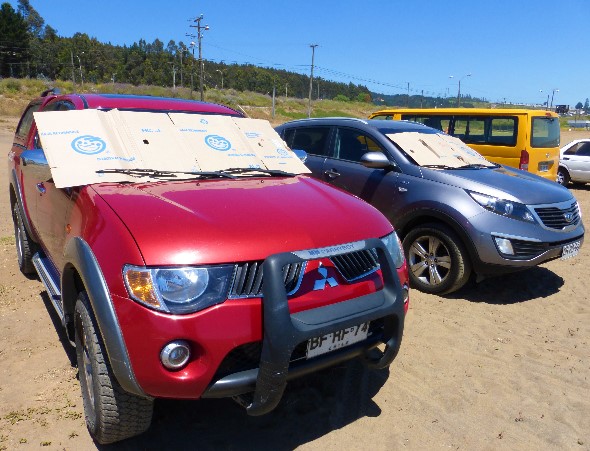 |
|||||||||||||||||||||||||||||||||||||||||||||||||||||||||||||||||||
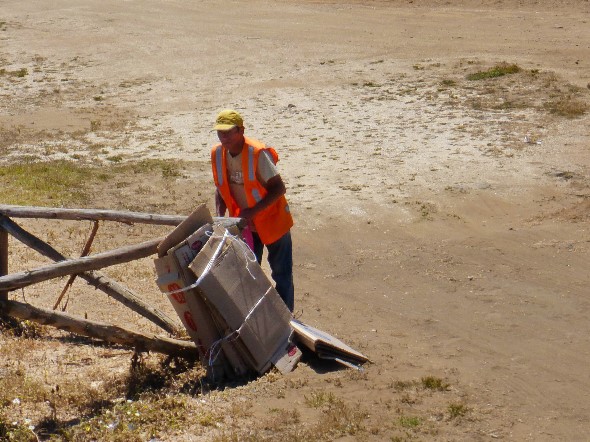 |
|||||||||||||||||||||||||||||||||||||||||||||||||||||||||||||||||||
Der erste Adventsonntag neigt sich zu Ende, die eingefallene Menschenhorde ist fast weg. |
|||||||||||||||||||||||||||||||||||||||||||||||||||||||||||||||||||
 |
|||||||||||||||||||||||||||||||||||||||||||||||||||||||||||||||||||
 |
|||||||||||||||||||||||||||||||||||||||||||||||||||||||||||||||||||
 |
 |
 |
 |
 |
|||||||||||||||||||||||||||||||||||||||||||||||||||||||||||||||
 |
|||||||||||||||||||||||||||||||||||||||||||||||||||||||||||||||||||